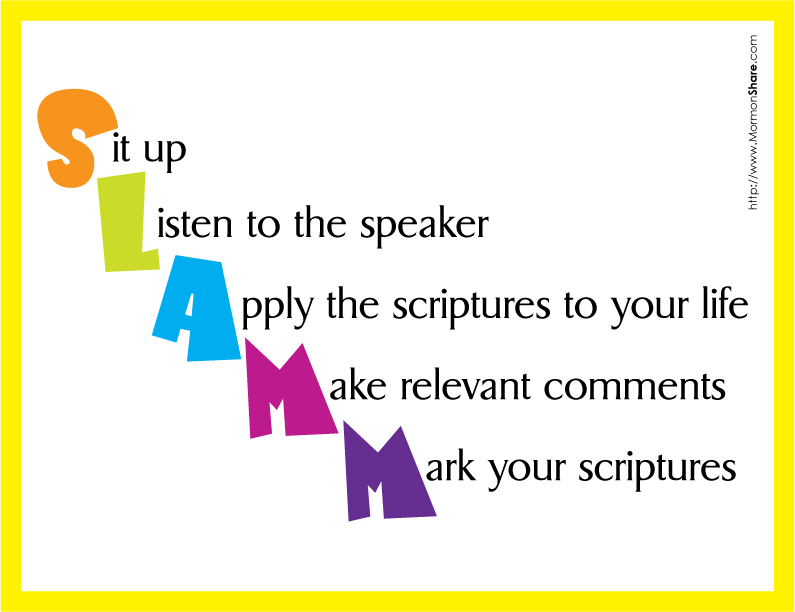Students hate Seminary for many of the same reasons they hate school. I know I hated school, and there were times I didn’t like Seminary, either. Below are three reasons students might hate Seminary:
- Seminary has no point. Students show up to a class where a teacher makes them memorize obscure scripture passages, sing silly songs made up from the books of the Bible, reads crazy long charts aloud, asks stupid questions they already know the answer to, and then cries at the end. Seminary seems like it’s about scripture chasing, factoids, proving you read the scriptures, and jumping through hoops.
- Seminary is boring. Seminary teachers often have strong testimonies of the gospel, and they love to share their experiences and feelings. If only everyone else loved the sound of teacher’s voices as much as they seem to… Plus, many lessons, if taught as they appear in the manual, are in fact, boring.
- Seminary feels like a prison. Students may be forced or coerced to go to Seminary. When they arrive, they sit in uncomfortable chairs, with assignments that keep them away from their friends, while someone tells them exactly what to do every minute — and all after getting up at a ridiculous hour of the morning, probably after the “warden” shouts at them to get up.
Seminary has no point.

So what is the purpose of Seminary?
Our purpose is to help youth and young adults understand and rely on the teachings and Atonement of Jesus Christ, qualify for the blessings of the temple, and prepare themselves, their families, and others for eternal life with their Father in Heaven.
Gospel Teaching & Learning Handbook, The Objective of Seminaries and Institutes of Religion
(I would also add “develop skills to find answers to their own and other’s questions about the gospel”, but Salt Lake didn’t call me when they were putting this together.)
The above is a brief statement of the overall purpose of Seminary. You’ll note there is nothing there about getting into a church school, getting to use the car on Friday, or attendance. Our purpose is lofty and eternal and is focused on Jesus Christ. At Seminary we learn skills that help us listen to and understand the Holy Ghost, answer questions, find courage to overcome trials, find strength to resist temptation, and seek repentance through Jesus Christ so we may return to live with our Father in Heaven.
Remember that Seminary is an optional class, but prepare your lessons as if your students’ lives depend on it.
Students “get to” come to Seminary. They don’t “have to” come to Seminary. Seminary is not a prerequisite for missionary service, entry into a church school, gaining a testimony, holding church leadership positions, or getting married in the temple. Yes, it’s the great elephant in the room. Teachers and parents often behave as if students will wither and die if they don’t attend Seminary. Joseph Smith didn’t have Seminary. The Virgin Mary didn’t. Adam didn’t. Probably Jesus Christ didn’t, either, and yet, all of these people achieved exaltation.
If Seminary isn’t required, then what IS the point of Seminary? Seminary is simply another opportunity to feel the Spirit. Elder Bednar has taught: “Reflect on the reasons we worship in the house of the Lord and in our Sabbath meetings [or Seminary]. Yes, we serve our kindred dead in the temple—and our families and friends in the wards and branches in which we live. And yes, we enjoy the righteous sociality we find among our brothers and sisters. But we primarily gather together in unity to seek the blessings of and instruction from the Holy Ghost. … Fundamentally, all gospel teachings and activities are centered on coming unto Christ by receiving the Holy Ghost in our lives.” (Receive the Holy Ghost, October 2010 General Conference)
As Seminary teachers focus on helping students receive and understand the Holy Ghost, we can help students
- find personal meaning in the scriptures,
- find answers to questions,
- gain or strengthen a testimony,
- communicate about the gospel with others in an inspired way,
- learn to resist temptation,
- develop skills to overcome trial, and
- find truth in peers’ gospel testimony and experiences.
Seminary is the first chance many students get to interact with the scriptures individually. It may be the first time anyone has ever asked them how they feel about a scripture, instead of telling them how to feel about it. If you are lucky enough to be teach early morning Seminary, Seminary gives your students a chance to suit up with the Armor of God before they enter the halls of a place that is decidedly ungodly. Seminary has a point, and to me that point is helping students feel the Holy Ghost daily.
Recognizing that Seminary is, in fact, totally optional can change a teacher’s perspective about everything that done in the classroom. If you understand that Seminary is an optional class, you understand that everything you do in class must be centered on helping students feel the Holy Ghost. You want your students to have a positive, spiritual experience each day. Your lessons will take on a student-centered focus. You will talk less and find ways to help students to share their impressions and questions about the gospel. Seminary will become less about checking off an item on a list of achievements, and more about learning to understand the Holy Ghost when he speaks. You will be free to rejoice as your students discover personal meaning in the doctrines found in the scriptures. Focusing on the Holy Ghost means that you don’t have to focus on your own words. The Holy Ghost will give students the sermon they need to hear irrespective of what you prepared.
Recognizing that Seminary is optional doesn’t mean that teachers can kick back, warm up some Pop-Tarts, and toss a church flick into the DVD player. Since Seminary is optional, teachers must plan meaningful lessons every day that help students recognize the value of time spent in class — your lessons must have a point. Meaningful here does not equate to “many hours of preparation time”. Well-planned, meaningful lessons have a clear objective with supporting activities. You will fill your lessons with group and individual sharing activities that directly support your lesson objective. Your lesson can be short, but students should know for certain that you are respectful of their time and sacrifices to attend Seminary and that you will prepare a meaningful lesson every day that is worth their time and effort to attend.
Developing “a point” to your lesson
I have found that when I’m planning lessons, it’s much easier to plan when I have a clear objective. After reading the scripture text, I write down a sentence or two that states what I’d like to accomplish when I teach that material. For me, this sentence usually starts with “Students will …” Then I select activities from the manual, student study guide, and my teaching techniques database that will accomplish that goal. My lesson conclusion is a restatement of the lesson objective, but with the words “Today we learned…” in place of “Students will …” I personally never read the manual first. I always start by reading the scripture block, followed by stating my lesson objective, and then I select activities from resources to accomplish my lesson objective. Other teachers probably prepare another way, but writing a short lesson objective will help you focus your activities and questions to give your lessons “a point”.
When identifying a point as you prepare your lessons, you might ask:
- Which two or three doctrines are of particular importance in this text?
- What would I like students to know/do when this lesson is finished?
- How can I help students understand why this doctrine is important?
- What activity(ies) can I use to teach this doctrine?
- How does this activity achieve the purpose of my lesson?
Point out “the point”
I have found that Scripture Mastery memorization activity increases when I take the time to demonstrate to the class how a scripture mastery can be used on a mission. We do Member/Nonmember role play type activities or I share an experience where I’ve been asked a question that can be answered by using a scripture mastery. In other words, I’ve explained “the point” of memorizing a particular passage, and students take the time to memorize a passage they are certain has value.
Sometimes when an activity is less exciting or I see that I’m starting to loose students, I take a second to explain to the class that I understand this may not be the most fun activity to everyone, and I explain exactly how this activity will support the purpose of our lesson. I promise I won’t waste their time. Students may not like the activity any better, but in my class, students participate more willingly when they understand why I’m doing a particular activity. Helping students understand why we activities can help them participate more willingly, which will give them more opportunities to feel the Holy Ghost, who will give them the sermons they need, and help them change their lives.
Consider asking students to write the purpose of Seminary and share it with the class or with you. You’ll find out a lot about why students are attending Seminary and how they feel about it. You may also find patterns that can help you adjust your teaching to help students appreciate “the point” of Seminary, which is nothing less than helping students gain peace and eternal life.
Seminary is boring.
None of us wants to admit that our class can be boring. We study several hours and get so excited about the scriptures that we are bursting with information and insights to share with our students. We are confident our enthusiasm will be infectious. Lesson time comes, but students are snoozing and chatting while we share the incredible things we learned. We can’t seem to get their attention. They straighten up to listen briefly at the end of the lesson to hear our testimony, which gives teachers just enough encouragement to do it all again tomorrow, while they snooze, text, and chat.
I can’t explain why all classes are boring (including my own), but if the pattern above sounds familiar, I can offer a few suggestions:
Prepare to talk less.
The typical Seminary teacher spends about two hours preparing each daily lesson. That time is often spent in trying to become an expert on the material. The teacher then develops a 40-minute lesson to share what s/he learned — can’t let all that work go to waste! Instead, try preparing your lessons so that you can talk less. Here’s what I mean: if you found something cool in a scripture passage, think carefully about how you discovered it. Is there a way that you can direct questions in your lesson to allow students to make the same or a similar discovery? How can you help them share what they discover?

Can you see the difference? Instead of preparing to become an expert, prepare to become a guide. Prepare your lessons in ways that have you talking less — ways that have students doing the talking and discovering. Find ways to help students make their own discoveries in the scriptures, instead of sharing your own. It’s the difference between looking at a picture of rapids and traversing them yourself. Help your students ride the rapids and feel the exhilaration of a new gospel discovery! Sharing these experiences with you and their peers will encourage them to try the rapids solo. They will begin to hunger to study the scriptures on their own and feel that Spirit again.
I have found preparing lessons hoping to guide students to discover gospel truths themselves results in better, less boring lessons, AND BONUS — I have found that I spend less time in preparation. In addition, students are more alert and far less likely to text or visit during classes where they are very actively participating.
“But wait,” you say, “if I prepare less, they might ask a question I can’t answer!”
If so, great! This is a perfect opportunity for students to watch you seek for an answer. It’s also a great opportunity for you to explain in a safe environment why some gospel questions are unanswerable. If the question is unanswerable, explain why. If the question is answerable, work with your class to use the study aids to find the answer. If you can’t answer the question during class, you might find the answer after class, and then share the answer first thing the following class period. Describe to the class how you found the answer. You might even plan time in your lesson to help students walk through the method for finding an answer. A difficult question is a perfect opportunity to help students use study skills in a real-life situation.
Ask better questions.
I’ve already addressed asking better questions here, and you can get lots of tips and ideas in that article. The most common mistake I see is Fishing, which is asking a question that has only one answer or when the teacher is fishing for only one answer. Try to ask questions to which students can share multiple insights. Here is a list of activities and suggestions that can help students share their insights more easily in the classroom, including ideas on what to do when you have one student who answers all the questions, or how to help every person participate.
Loosen up!
Take a page from the EFY model — you don’t have to be stone-cold-sober to learn the gospel. Learning activities can be both fun and spiritual. I’m not talking about basketball in the gym; I’m talking about Hey There, Delilah, Group Drawing, or any of the activities found here. Give kids a chance to enjoy each other. I find that students who enjoy a light-hearted experience together feel more comfortable sharing more serious thoughts. A little humor goes a long way in developing a classroom culture where students can ask questions and share experiences.
Seminary feels like prison.

Seminary can feel like a prison. Enter. Surrender your phone. Sit in your assigned seat. Be “reverent” (silent). Speak only when invited. Respond only in the specified way. Don’t leave until we let you out. Get Pop-Tarts on Fridays, but only if you’re good.
Teachers may feel like prison wardens — we are afraid the little cretins might escape! They might ask a disruptive question! They might speak out of turn! They might arrive late! They might text! They might laugh at us! They might not listen to us! They might ACT LIKE KIDS! So often, classroom rules are based on the wrong students might do. We are certain that students will riot the minute we cease being vigilant. We’re just so ….. afraid.
It takes a lot of faith to overcome the fear of what our students might do. You can prepare to handle many different situations by reading Stop Struggling, Start Teaching by Katie Van Dyke, written especially for gospel teachers. Stop Struggling, Start Teaching outlines a series of steps that teachers can use in difficult classroom situations. Have confidence that the Lord will draw a straight line with a crooked stick, even if that crooked stick is you. You’ve been called and set apart and can expect the Lord to use you to accomplish his purposes in your position as a Seminary teacher.
Set a few classroom rules.
I’ve heard of Seminary teachers who hand out many pages of rules. I think this is a bad idea. My advice is to spend less time worrying about what students might do, and focus on what you want them to do. I use the acronym SLAMM for my classroom:

S – Sit up
L – Look at the speaker
A – Apply the messages to your life
M – Make relevant comments
M – Mark your scriptures
We have some auxiliary rules, like no beverages that can spill and no texting during class, but it’s really pretty simple. Most of your students will have been in classrooms in and out of the church for most of their lives. They know how to behave. I try to focus on what I want them to do in Seminary that’s different than those basic rules of behavior (no hitting, no biting, no swearing, speak respectfully, etc). I don’t feel like I need to reiterate those known rules.
Think about what you’ll do when a student violates a classroom rule, and develop a plan for handling it. Students will violate your rules and the rules of basic behavior on occasion. If you have a plan you can stop most problems well before they get out of control. Most violations just take a simple reminder but have a plan in case things get a little crazy.
Provide opportunities for students to talk.
The cruelest part of solitary confinement, in my mind, is the isolation from other people. Even though others are in cells around you, they are prohibited from communicating. We can keep our classrooms from being like prisons by providing lots of opportunities for students to communicate. I’m not referring just to small talk, I also mean lively discussions about gospel topics.
The famous Linda D provides time in her classroom for Moments, or a time during opening exercises for students to share their missionary experiences and other uplifting or exciting things with the class. Your student talking time can be structured, like Moments, or it can be less structured, like during a game. Just make sure that you’re providing lots of opportunities for students to talk during class.
Make your Seminary room physically comfortable
Prison is stark. It’s not meant to be a place of comfort. Church classrooms can also be stark. Do your best to set up your classroom in ways that encourage participation and help the classroom feel comfortable.
- Set your classroom up in order to remove barriers between you and students and encourage participation while discouraging problem behaviors.
- Lobby until you get some padded seats for your classroom. Make sure the kids know you are advocating for them.
- Provide storage space for student items, including backpacks, instruments, and items regularly used in class.
- If you’re at a church building, figure out the thermostat so that you can adjust the temperature. I know one teacher who brought a basket of blankets for her students to use in a perpetually cold classroom.
- Arrive early enough to turn on the hallway, classroom, and outside lights.
- Ensure seats are appropriately sized.
- Ensure left-handed students have space.
- Ensure visually impaired students sit at the front of the classroom.
- Ensure you speak loudly and clearly for hearing impaired students. Try not to speak when you are facing away from the class.
- Ensure bathrooms are clean and stocked. I cleaned out a drawer in my bathroom at home and invited female students to bring a few of their preferred feminine products to store at my house in case of emergency.
Classroom culture
There is a lot of information on developing a classroom culture in Teach Like a Champion by Doug Lemov. This is the teaching book that has helped me the most in my classroom. I think the ideal Seminary culture is one of learning and sharing in a comfortable, respectful environment. This environment helps students share their experiences and ask questions.
Of the things I do in my classroom, I think these are the things that are most important in developing our classroom culture:
- Laugh with your students.
- Laugh at yourself.
- Treat all questions (even the less intelligent/rude/disruptive ones) respectfully.
- Do not allow rude or disrespectful comments by students about other students or teachers.
- Take advantage of the time before class to discuss school work and sports with your students.
- Be respectful of students and parents by ending class on time. I set an alarm on my phone for five minutes before class should end. When it went off, it helped me finish up whatever we were doing and wrap up the lesson effectively without feeling rushed, and students never missed the bus.
The Celestial Kingdom
I’ve still got a long way to go in reaching the Celestial Kingdom of Seminary in my own classroom. There are days that my lessons are boring, that I clamp down on my students like the toughest prison warden, and even occasionally days that I can’t see the point. Some day I’ll reach Seminary nirvana, but until then, I will keep trying to help my students have positive experiences with the scriptures. I really do believe that Seminary is a structure that can help students become not only better gospel scholars but better gospel do-ers.
Prison Bars Image courtesy of sakhorn38 / Darts Image courtesy of creativedoxfoto / FreeDigitalPhotos.net


